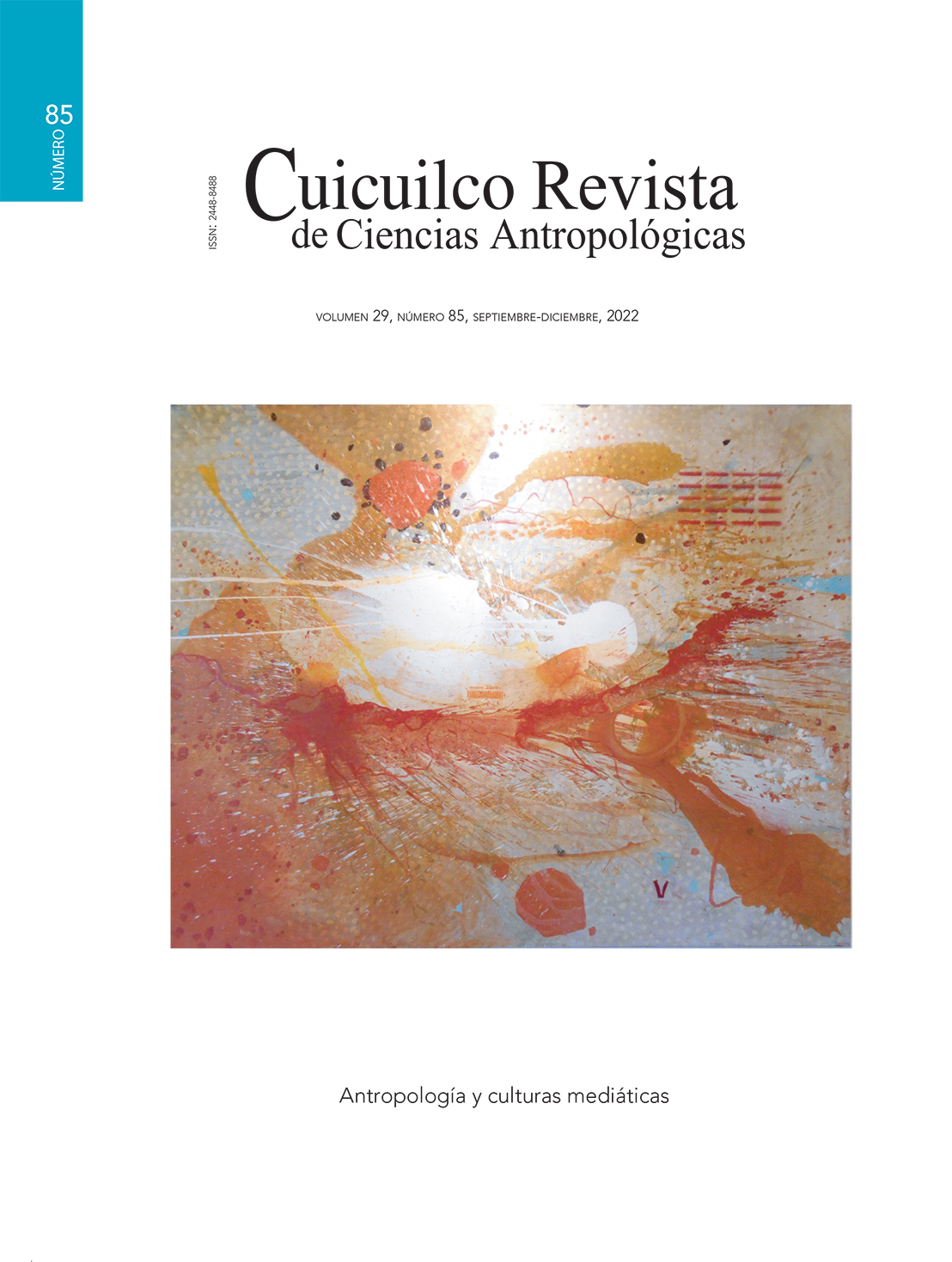Dossier
Images of the Present: cultural mutations and new subjectivities: Anthropology, mass media and psychoanalysis
Published 2023-01-20 — Updated on 2023-04-23
Versions
- 2023-04-23 (2)
- 2023-01-20 (1)
Keywords
- Anthropology, Mass Media, Cinema, TV Series, Psychoanalysis
How to Cite
Images of the Present: cultural mutations and new subjectivities: Anthropology, mass media and psychoanalysis. (2023). Cuicuilco Revista De Ciencias Antropológicas, 29(85), 73-98. https://revistas.inah.gob.mx/index.php/cuicuilco/article/view/18971 (Original work published 2023)
Abstract
The objective of this paper is to analyze, in the light of anthropology of the media in conjunction with a critique of culture inspired by psychoanalysis and its clinic, a set of film and television products that stage some of the cultural mutations that impact our contemporaneity. The digital revolution, the redefinitions of gender identities, generational differences and interethnic and interracial relationships, are the subject of reflection through films and series that deal with these phenomena and reveal the profound changes in the figures of the subjectivity product of late capitalism.
Downloads
Download data is not yet available.
References
- Augé, Marc. (1995). Hacia una antropología de los mundos contemporáneos. Gedisa. Barcelona.
- (1998) La guerra de los sueños. Gedisa. Barcelona.
- Braunstein, Jean François. (2019). La filosofía se ha vuelto loca. Ariel. Barcelona.
- Breton, Stephane. (2005). Télévision. Hachette. París.
- De la Peña Martínez, Francisco. (2009). Las imágenes de la locura en el cine como representaciones culturales. Cuicuilco (16) 45: 11-26.
- (2015) Imaginarios fílmicos, cultura y subjetividad. Por un análisis antropológico del cine. INAH-Navarra. México.
- (2020) Mundos mediáticos y antropología del presente. De la cultura televisual a la cultura digital. INAH-Navarra. México.
- Dufour, Danny-Robert. (2007). El arte de reducir cabezas. Sobre la servidumbre del hombre liberado en la era del capitalismo total. Paidós. Buenos Aires.
- (2009) La cité perverse. Éditions Denoël. París.
- Gherovici, Patricia. (2010). Please select your gender. From the invention of hysteria to the democratizing of transgenderism. Routledge. Londres.
- Gingsburg, Faye, Lila Abu-Lughoud y Brian Lankin (eds.). (2002). Media Worlds. University of California. Londres.
- Han, Byung-Chul. (2013). En el enjambre. Herder. Barcelona.
- (2014) Psicopolítica. Herder. Barcelona.
- Imbert, Gerard. (2019). Crisis de valores en el cine posmoderno. Cátedra. Madrid.
- López Mondéjar, Lola. (2022). Invulnerables e invertebrados. Mutaciones antropológicas del sujeto contemporáneo. Anagrama. Barcelona.
- Mauss, Marcel. (1979). Efectos físicos ocasionados en el individuo por la idea de la muerte sugerida por la colectividad, en Sociología y antropología. Técnos. Madrid.
- Milmaniene, José. (2010). Clínica de la diferencia en tiempos de perversión generalizada. Biblos. Buenos Aires.
- Miller, Daniel. (2011). Tales from Facebook. Polity Press. Cambridge.
- Olabuenaga, Ana María. (2021). Linchamientos digitales. Paidós. México.
- Recalcati, Massimo. (2021). El hombre sin inconsciente. Paradiso. México.
- Rothenbuhler, Eric y Mihai Coman (eds.). (2005). Media Anthropology. Sage Publications. Londres.
- Shohat Ella y Robert Stam. (2002). Multiculturalismo, cine y medios de comunicación. Paidos. Barcelona.
- Soto Ivars, Juan. (2017). Arden las redes. La postcensura y el nuevo mundo virtual. Debate. Madrid.
- Viveiros de Castro, Eduardo y Deborah Danowski. (2019). ¿Hay mundo por venir? Ensayo sobre los miedos y los fines. Caja Negra. Buenos
- Aires.
- Wolton Dominique. (2004). La Otra mundialización. Los desafíos de la cohabitación cultural global. Gedisa. Barcelona.
- Zizek, Slavoj. (1992). El sublime objeto de la ideología. Siglo XXI editores. México.
- (2019) Roma está siendo celebrada por todas las razones equivocadas. The Spectator, 13 de enero.
- (2021) Como un ladrón en pleno día. El poder en la era de la poshumanidad. Anagrama. Barcelona.

